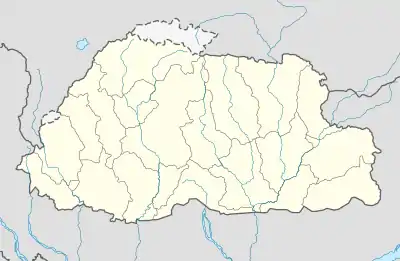| Könchogsum Lhakhang | |
|---|---|
 Courtyard of Konchogsum Lhakhang | |
| Religion | |
| Affiliation | Tibetan Buddhism |
| Location | |
| Location | Bumthang |
| Country | Bhutan |
 Location within Bhutan | |
| Geographic coordinates | 27°35′07″N 90°44′21″E / 27.58528°N 90.73917°E |
| Architecture | |
| Date established | 8th century |
Könchogsum Lhakhang, also known as Tsilung, is a Buddhist monastery in central Bhutan.
History
According to Pema Lingpa, the temple was founded as far back as the 8th century. In 1039, Bonpo Dragtshel, a tertön, discovered texts which had been buried by Padmasambhava in this location.[1] According to a legend, the king of the water deities was said to have risen out of the lake beneath the temple and offered Dragtshel a stone pillar and scroll.[1] This concept of a lake beneath the monastery is also reiterated in another legend in which Pema Lingpa is said to have discovered the subterranean lake. The entrance was concealed with a stone and stands until today, in the courtyard of the monastery.[2]
In February 2010, Könchogsum Lhakhang was severely damaged by fire[3] and has since been rebuilt.[4] The new temple and monastery was consecrated in November 2014.
Architecture
The temple contains a statue of Vairocana in its main sanctuary and statues of Padmasambhava, Avalokiteśvara, and paintings of Pema Lingpa and Longchenpa.[2]
References
- 1 2 Pommaret (2006), p. 228.
- 1 2 Pommaret (2006), p. 229.
- ↑ "Bumthang - Kenchosum lhakhang". RA Online. Retrieved 17 November 2014.
- ↑ "Kenchosum Monastery – Rigzin Pema Lingpa Foundations".
Works cited
- Pommaret, Francoise (2006). Bhutan Himalayan Mountains Kingdom (5th ed.). Odyssey Books and Guides.
External links
- Konchogsum Lhakhang - Bhutan Cultural Atlas
- Kenchosum Monastery - Pema Lingpa Foundation